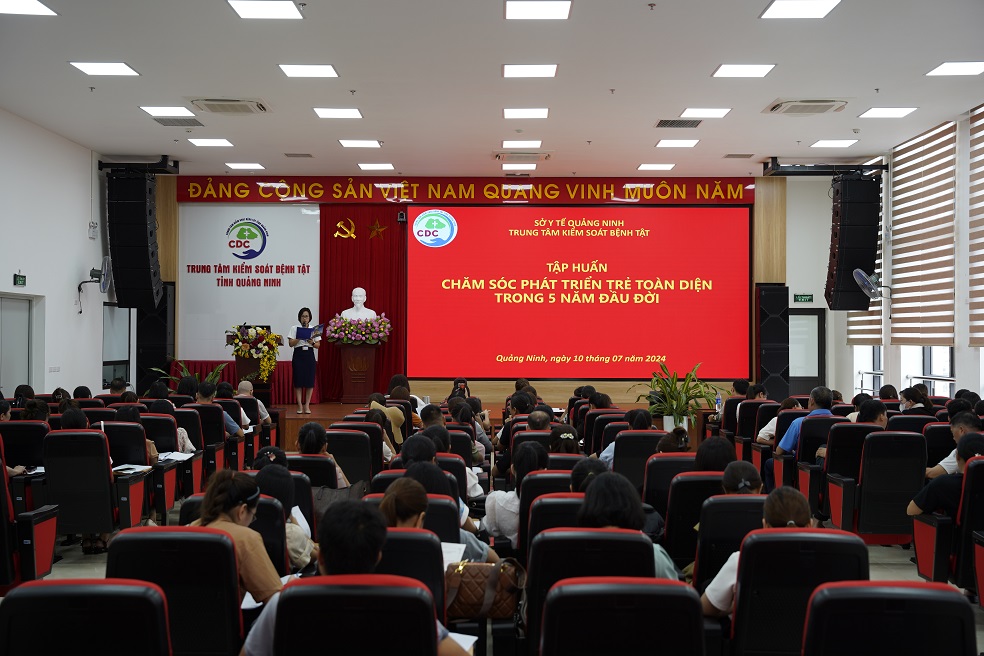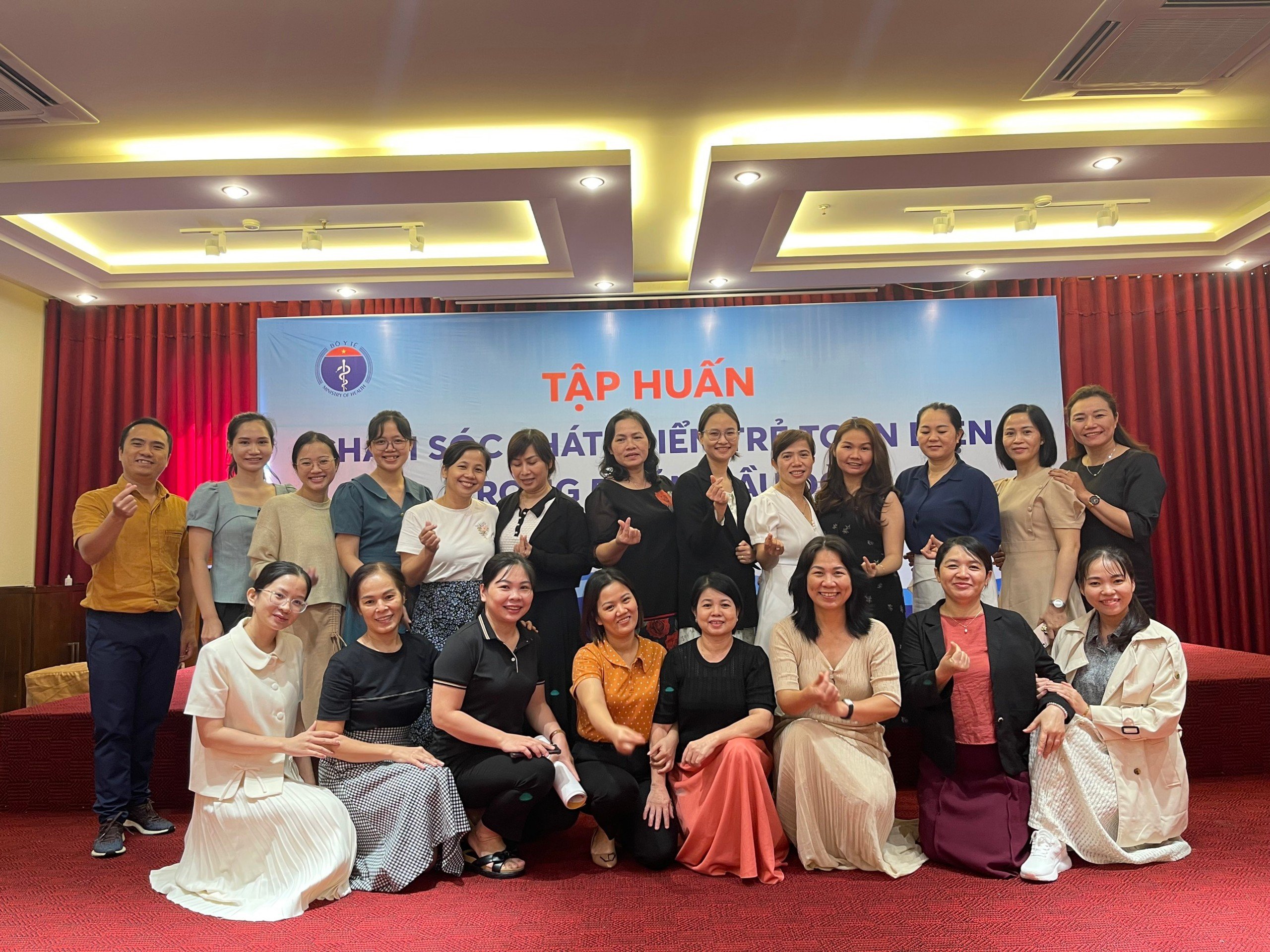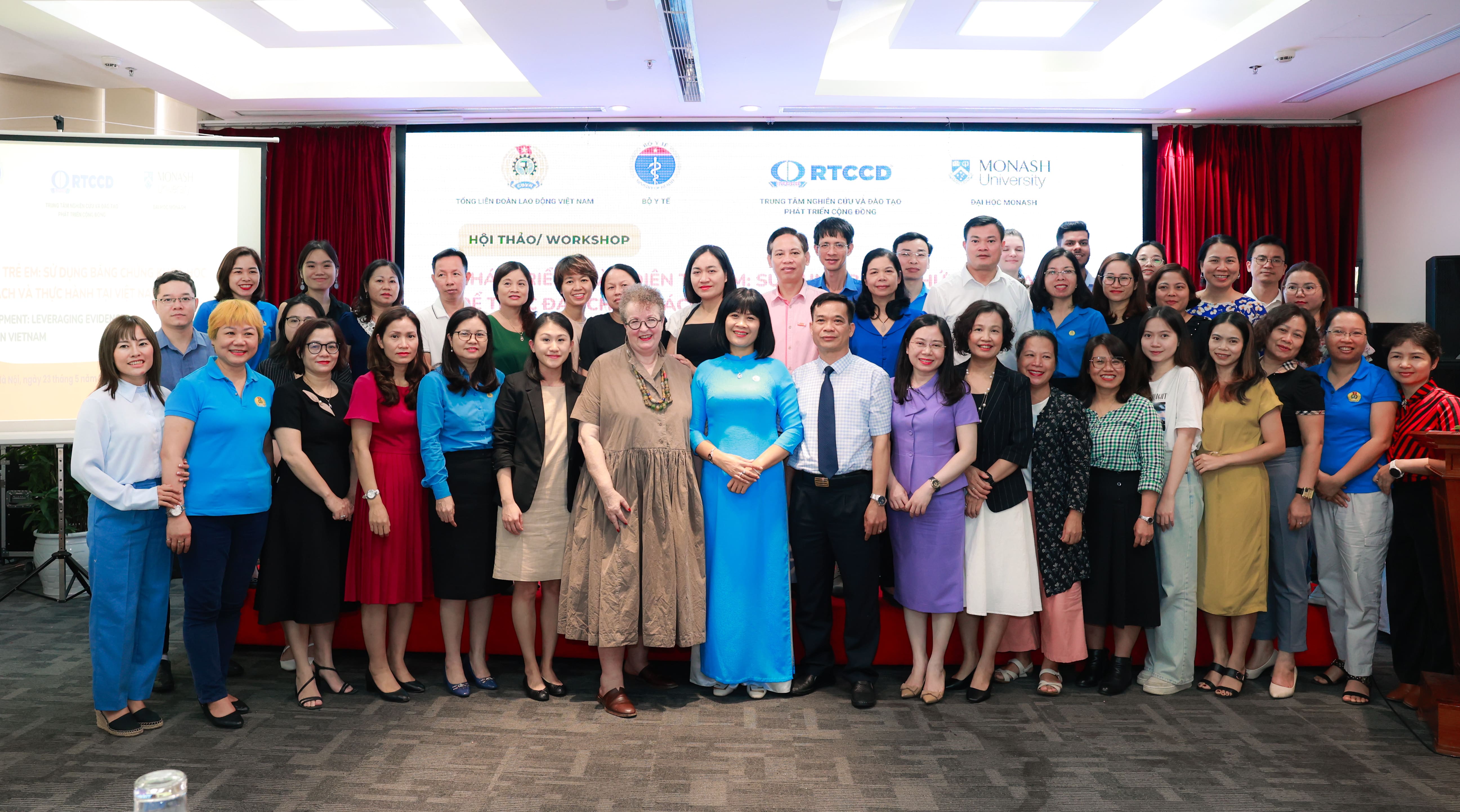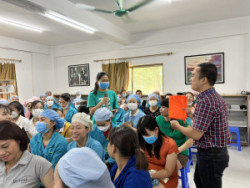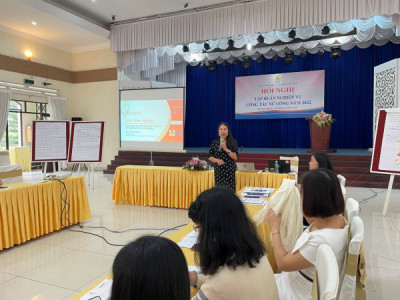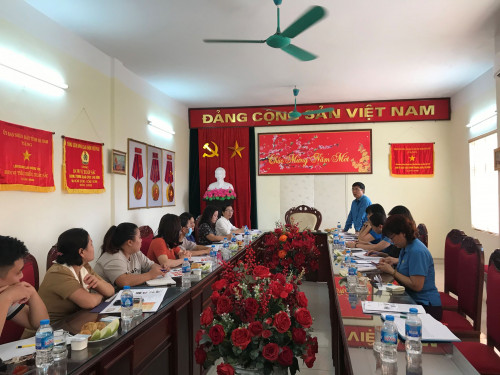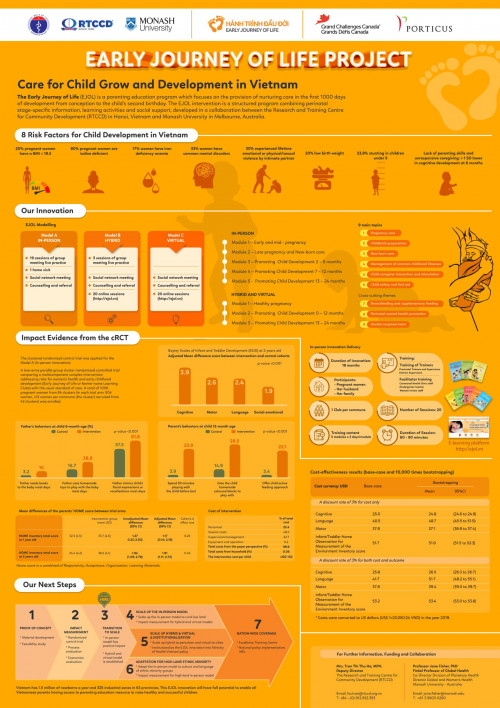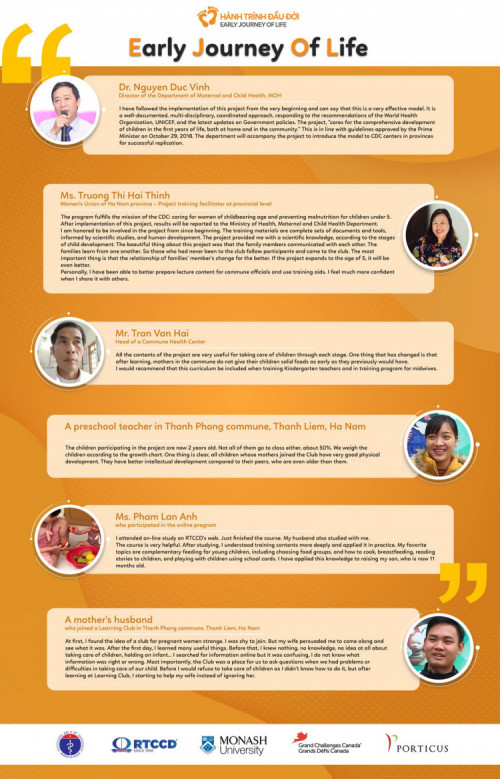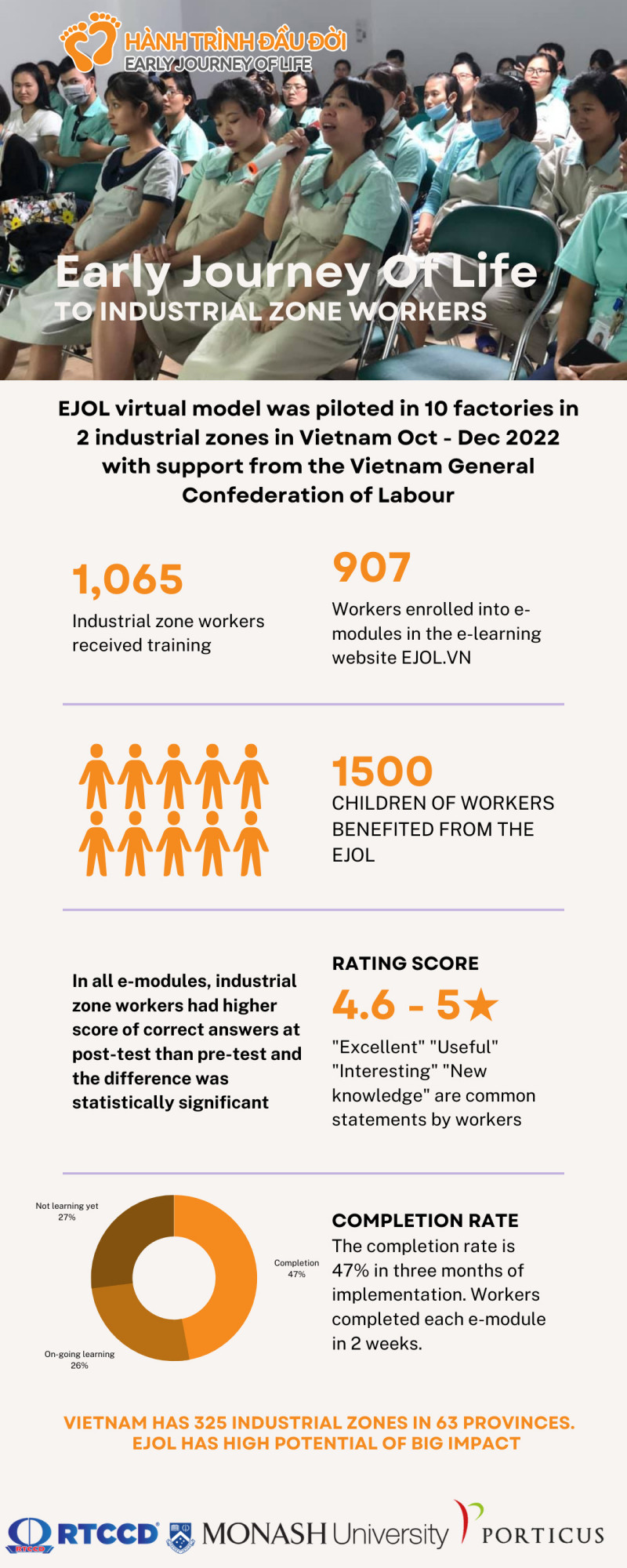Introduction
The “Early Journey of Life – EJOL” (TTS3) is an extended phase of the former project “Learning Clubs on the first 1000 days” (TTS2). The third phase EJOL (October 2020 – March 2022) will be implemented with the technical support from the Ministry of Health Vietnam, with financial support from the Grand Challenges Canada. Implementing partners are the Research and Training Center for Community Development (RTCCD) Vietnam, the Monash University Australia and the Ha Nam provincial Department of Health. The EJOL focuses on: (1) rolling out the innovative models to all 116 communes in Ha Nam province; (2) supporting the Ministry of Health Vietnam to develop the national guideline for health workers on examination and counseling on early childhood development; (3) adapting and delivering the innovation in Hanoi for the business pilot. The project aims to extend the intervention program, covering the first 2000 days of a child’s life.
Why is it called “early childhood development in the first 2000 days of life”? As we know, the golden 1000 days of a child is conception until a child is 2 years old. The 2000 days reach to children at their 5th birthday. The EJOL will provide a parenting education package to make sure that a child reaches their full potential via parents’ good practices in childcare, stimulation and early learning.
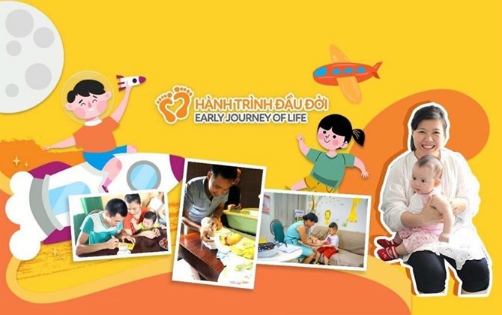
Content of the model
Phase 3 of the model includes: (1) The implementation model in Hà Nam rural Province and (2) business pilot model in Hanoi City.
Implementation Model in Hà Nam Province
- Target Age Group: The first 1,000 days of life (from pregnancy to when the child turns 2 years old)
- Target Participants: Pregnant women and their husbands; parents and grandparents of children aged 0–2 years
- Intervention Structure: include (1) 20 in-person sessions in total, including 19 practical sessions at the commune health station and 1 home visit by health staff within 7 days after birth to examine the mother’s and baby’s health, and provide practice-based guidance on newborn care and (2) three e-courses focusing on the first 1000 days (optional).
These 20 sessions are divided into 5 modules: Module 1: Early and mid-pregnancy care; Module 2: Late pregnancy and newborn care; Module 3: Care for children aged 1–6 months; Module 4: Care for children aged 7–12 months; Module 5: Care for children aged 1–2 years
The EJOL will offer the further courses to caregiver on parenting skills and child care for children aged 2–5 years.
- Intervention Content: Includes prenatal care (vaccination, medication, nutrition, managing pregnancy discomfort), birth preparation (breathing exercises, preparing baby items), breastfeeding and active complementary feeding, newborn care (bathing, massage, cleaning and diaper changing), care for sick children (cough, fever), early learning, responsive caregiving, prevention of perinatal maternal anxiety and depression, father’s engagement, first aid, and injury prevention.
- Implementers: Commune health staff, Women’s Union members, and preschool teachers (collectively referred to as “Facilitators”)
- A Session Format: Facilitators show caregivers a video and guide them to practice accordingly. All caregivers practice together and agree on key messages and correct behaviors for child care. Sessions are held on weekends or integrated into vaccination days (before or after vaccination), lasting 45–60 minutes, with around 15 households participating.
- Community Behavior Change Promotion: Each commune health station creates a Zalo group among caregivers to share message posters, remind parents to practice newly learned behaviors with their children, and answer questions. Beautiful photos from the sessions are also shared in the group to encourage fathers to join future club meetings.
Pilot Model in Hanoi City
In Hanoi, the pilot program organizes paid training classes for parents to explore their needs and readiness to participate. Each class lasts about 2 hours and focuses on hands-on practice by topic. Participants are grouped based on similar child age ranges or pregnancy stages (mid or late pregnancy).
Click here to read the EJOL Progress Report update by 31 December 2022.

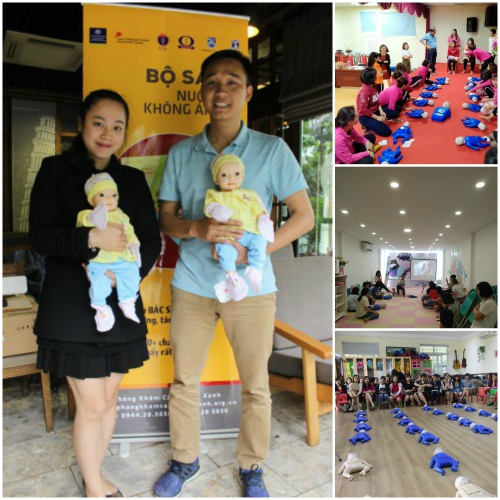
Feedbacks of participants
The program has received extraordinary interest of the community because of its benefit to the next generation.
The local government authority coordinates the three sectors involved in this program (kindergarten teachers, commune health station staff and Women’s Union staff) at commune level. “The program shared our vision, which is to improve the quality of human resource and poverty elimination with the involvement of multi-sectors” (Deputy Head of the Ha Nam Provincial Department of Health). The program also received support from the Vietnam Women’s Union. “The books are beautiful, color printing, nice writing and good content. There must be a lot of work and efforts from doctors and the project team. I wish that I had these books when I was pregnant with my son” (Provincial Women’s Union leader)
“This approach is consistent with our vision, fulfilling the gap in health care for women and children. This project meets the needs of our staff at the grassroots level. We desire to further develop policies for rural areas”. (Nguyen Thi Tuyet Mai, Head of Family and Social affairs Department, Vietnam Women’s Union). In terms of health sector, the program was shown to be “aligned with other national health programs such as nutrition, breastfeeding, reproductive health and maternal and child health programs” (Deputy Head of Ha Nam Provincial Department of Health).
The leaders of the Ha Nam Provincial Department of Health have indicated that they are so impressed with the program, the community interest it has generated and its potential to improve early childhood development, they are committed to roll the program out at local scale to all 116 communes in the province. “After receiving the scientific evidence of the program and the permission from Ministry of Health, we are happy to be the first province in Vietnam to scale up the program in the whole province. We have the budget for this scaling up phase.” (Dr. Van Tat Pham – Deputy Head of HaNam provincial Department of Health).
After 6 months of club implementation in the field, 90% of eligible women attended the 8 pregnancy sessions; 34% of their husbands and 21% of grandparents attended at least one session during the module 1 and module 2. In the module 3 and 4, the participant rate of the husbands increased to 40% and that of the grandparents doubled to 47%. Women said that since their husband joining the clubs, their husbands did more house chores and were more gentle to their wives. Fathers directly bathed their babies in the first week of birth and learned mimic their baby’s gesture and sounds.
The unique values
· EJOL follows the World Health Organization recommendation of nurturing care: good health; adequate nutrition; responsive caregiving; security and safety; and early learning.
· EJOL provides intervention package based on vivid pictures (video clips and posters), step-based instruction at group meetings (practice on a doll and baby), and create group’s interaction to boost parental behavior changes and peer support via social network (Zalo)
· EJOL program encourages fathers to engage and spend quality time with his child and be kind, gentle and supportive to his wife; also invites grandparents to join the group meetings to learn about early childhood development.
· The EJOL has technical and policy support from the Ministry of Health (Department of Maternal and Child Health) and technical supports from specialists in local hospitals in Vietnam, Monash University and Melbourne University, Australia.
· The EJOL phase 3 is implemented with a new mindset of business, promoting the cost contribution from families and corporate social responsibility to cover for the cost of innovation management.

Coverage and Visibility
At the present, the EJOL project is implemented in 42 communes in Ha Nam province. In Hanoi, the model has been broadcasted on a youtube (Link) channel and Facebook group (Link) from December 2019. There were 21 classes organized, around 900 parents, grandparents, and preschool teachers attended to classes (from January 1st, 2019 – April 30th, 2020)
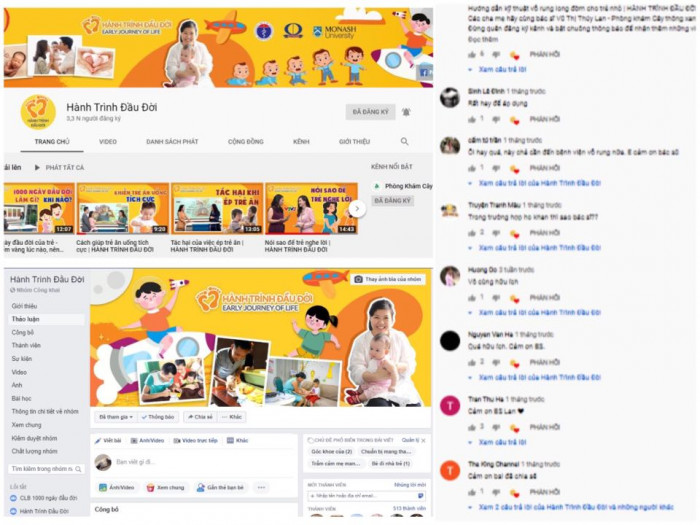
The program was introduced on two national channels which are Morning Coffee on VTV3 – similar to Good Morning America (broadcast on April 3rd, 2019 – National television VTV3) and the Obstetrics map on VOV2 (broadcast on February 21st, 2020 – Radio The Voice of Vietnam VOV2, Click here to listen)

Invitation for Cooperation
The EJOL desires to work with:
· Non-Government Organizations (NGOs) and Centers for Disease Control (CDC) in Province to scale up the EJOL model to other provinces in Vietnam.
· Development funders to develop intervention material to cover the ages of 2 – 5 years and pilot the innovation in industrial zones and poor urban settings.
· Donors to develop an online education system through a mobile app.
· Corporations that have the same target of clients from 0 – 5 years old in the Hanoi area.
Contact Information:
MSc. Tran Thu Ha
Deputy Director, RTCCD Organization.
Tel: (024) 3628 0350 or 091 2552 393
Email: ha.tran@rtccd.org.vn


